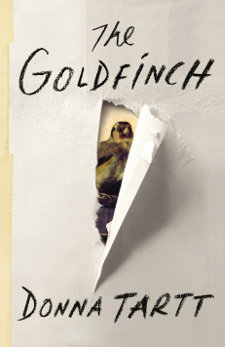By Elaine Burns
 This novel was awarded the Pulitzer Prize for 2014. It is the third novel for the author and by her account took 11 years to write.
This novel was awarded the Pulitzer Prize for 2014. It is the third novel for the author and by her account took 11 years to write.
Donna Tartt first burst onto the scene in 1996 with her debut novel The Secret History, which brought her much acclaim. Her second novel, The Little Friend, published in 2004, was panned by critics and the public, leading to speculation that she was in fact a one-hit wonder.
The Goldfinch was published in 2013 and was hailed as “the best in literature this decade”. As one critic stated, “You could not go to any gathering without someone asking if you had read it, and wasn’t it wonderful”. Hence, probably, the Pulitzer award.
The Goldfinch is the tale of Theo, who is left without his mother in a terrorist bombing of the Metropolitan Museum of Art in New York City. Theo and his mother go specifically to the museum to see the painting called “The Goldfinch”, by Dutch master Carel Fabritius. This is her favourite painting due to the detail reflected in this very small oil.
Out of the rubble of the bombing Theo takes the painting, possibly to give to his mother as a surprise. He is, remember, shellshocked by the blast, and his mother was not immediately with him. He believes he will see her at home. The instigation for this decision is an old man who indicates the painting, as well as giving Theo a ring and an address while in the process of dying.
His mother does NOT come home and Theo must acclimate himself to the life of an orphan, his father having walked out on them several years before. During the course of the next year of his life he feels accepted by the family of a school friend. The family is dysfunctional at best but they take good care of him and he developes a strong attachment to the mother.
He follows the instructions of the man who was dying in the museum and is introduced to Hobie, a furniture restorer who was partners with the old man in business and life. He also meets Pippa, a very fragile orphan who lives with Hobie and the old man, who is her uncle.
Unsolicited, Theo’s father and his new wife arrive to pick him up and bring him back to their home in Las Vegas, thereby ripping him away from another mother.
Dysfunction rises to new levels as Theo finds himself involved with the mob, both American and Russian. He also finds a friend, Boris, who introduces Theo to drugs, alcohol, and a life subject to no rules. With the death of his father Theo needs once again to reinvent himself and by this time he is only 14 years old.
What follows is a story, as some have said, almost Dickens-like. It is not therefore surprising to discover that Oliver Twist was the author’s favourite book. Upon being published in 2013 The Goldfinch won critical acclaim. Many have defined it as the pivotal novel of its time. This acclaim should have ended the debate on one-hit-wonderdom. However, shortly after the awarding of the Pulitzer, there started to appear increasing numbers of critics who loudly disclaimed the book. This has started a huge literary-scene battle, with one camp still considering it a masterpiece and one considering it a “turkey”, as one critic called it. There does not seem to be a middle ground and passion rises high in both camps. The con critics feel it is not in the least Dickensian, but rather of the Harry Potter ilk. They believe it is a book that should be considered children’s literature.
Donna Tartt, the author, is mute on the subject. She is not one to take part in authors’ tours or interviews, and by her own admission once her novel is launched, she likes to start the next. This is probably a good thing as The Goldfinch took eleven years to write. Immersion in her novels is something she cherishes, likening it to the childhood experience of “getting completely lost in the other world of the book”.
We were almost unanimous in very much liking the first half of this very long book. We did, however, find the last half disjointed and cliché-like in its writing. The plot seems almost unbelievable.
So we, unlike the critics, did find a middle ground. Those that had read Tartt’s first novel The Secret History felt it was a great read.
Should you read it? We were split on whether we would recommend this to a friend. But, if you want to be able to weigh in on these controversial conversations then reading it is a must. Please bear in mind that at upwards of 600 pages this is not a small commitment.
Our verdict: an OK read.
June’s book: Mary Coin by Marisa Silver
FOML update:
THE NET SHED IS OPEN!
Come and browse, choose and pay for by donation any of our wonderful ‘gently used’ books.
Donations of books can be dropped off at the net shed from 10:00 am – 4:0pm Saturday and Sunday. Remember we do not take encyclopedias, magazines, or Reader’s Digest compilations.












